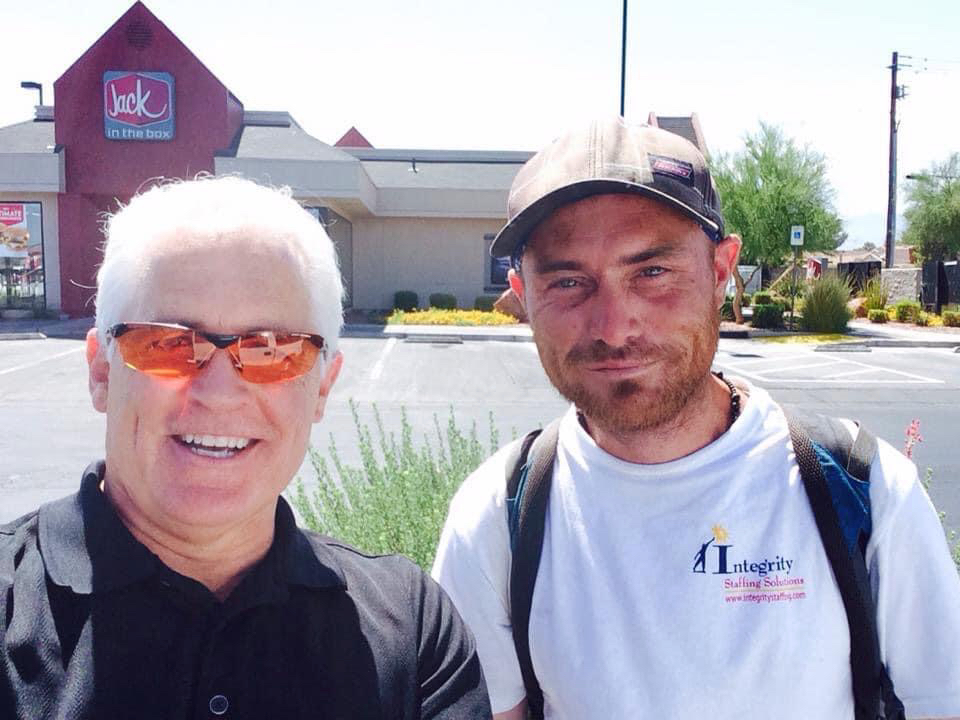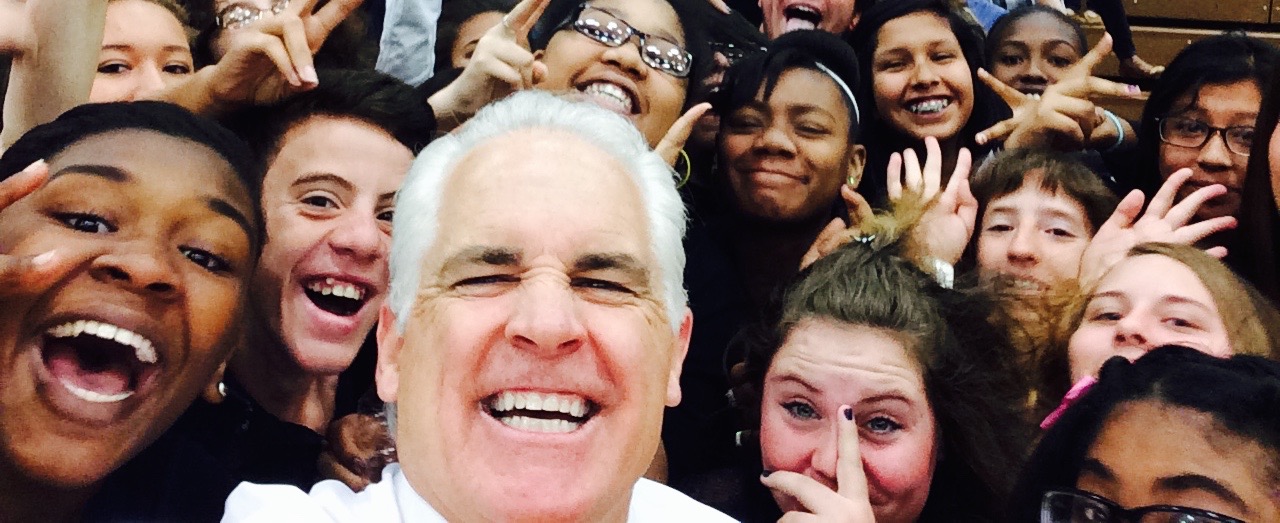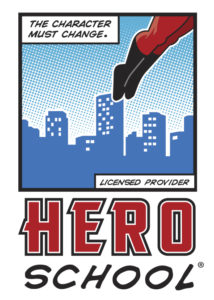It’s becoming the norm when yet another multimillion-view YouTube video, posted by some homeless helper, takes an ugly turn.
I originally viewed this wonderful story of heroism and redemption about 10 months ago. Today, the same video was posted again on social media, but this time with dozens of negative comments. This is when I learned that the woman who “helped” a homeless man by raising gobs of money through “Go Fund Me” had apparently kept most of it. Dang. She said he blew the money on drugs. Only they know the truth.
This story reminds me of the saying,
“When the blind lead the blind, they both fall in the ditch.” -J.C.
More and more of these homeless stories end like this. Mostly because it’s math.
A + B = C.
Of course the equation for freeing a person from homelessness is also math. I learned the first equation in 3rd grade. Next month, it will be 23 years since I discovered the math of homelessness through my active research and practice.
The most common error made in “helping” the homeless, whether by solid citizens or conscientious politicians, is confusing homelessness with houselessness.
Homelessness is a complex, internal, learned human condition. Houselessness, by contrast, is a temporary societal state, based on external circumstances.
Motives matter.
Unless the purpose for the intervention with the homeless person is freedom (not control), the motive for one’s YouTube video is inspiration (not views or self-interest), and the person intervening has at least four years of education in Character Change psychology…plus training in the 4 Habits of Homelessness and Strategic Street Interventions…and as everyone who has encountered a homeless person in America knows, is also a Bible scholar (of the first 10,204 homeless individuals I helped of the streets, all but 5 were self-described Christians), then the final state of both parties might be worse than first.
This is no job for amateurs.
What amateurs are supposed to do is direct the person stuck in homelessness to where the safety, resources and ideally, the solutions are.
Instead of raising money for an individual who has already proven incapable of managing money, feel free to raise the same amount for an agency, charity or an actual expert who is qualified to restore them. Only by redirecting your compassion into a transformation system can you change the person beyond just helping them, and you will likely also help a hundred or even a thousand more like him or her, for the same amount of money.
Of course most amateurs who “help” the homeless don’t (or won’t) seek out the expert. They instead risk multiplying the 4 Habits of Homelessness (Todd, T. 1995) by leading with their feelings, their beliefs or their data-driven designs. Instead of investing in deeper preparation, comprehension and mastery, amateurs can even contribute to the spread and propagation of the culture and ecosystem of dependency. Misguided “help” further reinforces the homeless person’s learned helplessness, resistant behavior and sense of entitlement. You know the result: more dependency, more years on the street, more rebellion against rules and more resistance to services.
These outcomes comprise a pretty good reference test on whether the person working with the homeless is an amateur. This is not a bar we can lower. Outcomes are everything. Or to quote the author of American Psychology, William James:
“Truth is what works.“
Perhaps the most tragic outcome is the erosion of safety. Amateurs unwittingly put every other citizen in the community at greater risk of harm due to the homeless person’s increasingly dependent and later, accusatory behavior. Telling a dependent or desperate person “no” after a series of entitlements will earn even the sweetest golden-hearted enabler a vicious verbal (and sometimes physical) attack. The leaders and residents of Seattle, Portland, Los Angeles, San Francisco, Honolulu, San Diego, Las Vegas and even Salt Lake City are beginning to learn this lesson, and at an ever-increasing cost: Desperate people will bite the hand that stops feeding them.
Do some amateur “homeless helper” stories work out? Probably. And that, too, is math. (Hint: the type of person who can succeed with the homeless is usually a small business owner, e.g., the type of character comprised of the traits that can reverse the philosophy and 4 Habits of homelessness.)
Many amateurs innocently believe that being a good soul qualifies one to engage, ignite and restore a human life in this condition – without at least the education and experience of a master therapist, medical specialist or high-level strategist. Some even believe that money – or a house – is the solution to an internal uniquely-human problem. Maybe they confuse homeless human beings with feral cats and dogs, creatures that can be easily adopted from our neighborhoods or no-kill shelters… and who won’t break back into your house after you fed or clothed them, bring their friends, and steal your money, jewelry and phone charger.
Besides, trying to “help” the homeless with food and shelter – the same tools we use with stray cats and dogs – is as short-sighted as it is dehumanizing.
Human complexity is the primary reason why there are too few experts and professionals in the homelessness intervention, prevention and reversal business. Amateur Arrogance, if there is such a thing, is the other. And it’s likely to remain that way since most who’ve been socialized in recent generations are convinced they can master a craft, art or discipline by watching a couple of YouTube videos. And Disney’s Ratatouille.
Before the age of Amateur Arrogance, we had Truthiness. Thanks, Google. Now everyone’s an expert. Before that, authentic leaders battled Academic Arrogance. We may never know just how many human solutions were derailed in that era by the belief that a credential, certificate or title conferring “expertise” or “leadership” was proof of human mastery. Even pop-psychology agrees that it takes 10,000 hard-earned hours to master a single discipline. The Force may be strong in this one, but you’re not a Jedi yet. And this is also why I won’t start snowboarding at my age.
It appears another understanding lacking in both groups is the depth of what it means to be human. After all, regardless of their external condition or circumstances, homeless people are still, underneath the hood, human beings, with 16 intricate internal tumblers to align and unlock. This is in addition to the 4 Behavioral Habits, and their biological, sociological and economic programming, plus myriad lines of broken code to debug and defrag.
There are myriad ways to become houseless in America. And not all houseless people become homeless people.
Even in our technological age, our top universities and Big Data advocates have proven themselves to be amateurs when it comes to homelessness. In just the last decade, amateurs blinded by self-interest, scale and annoyance have leveraged their Amateur Arrogance and produced yet more homeless people – not less – struggling on the streets, in parks, on sidewalks and in shopping centers in every major city. This, too, is math. Amateurs + Homeless = Crisis.
If the amateurs would just stop, we’d only have the homeless to restore, not a crisis. If the amateurs would both stop and invest the time to learn from masters how to Turn Pro with this complex population, we could end the current crisis and ultimately end homelessness.
If cities simply redirected some of their clean-up costs into helping turn these golden-hearted amateurs into professionals…
But wait, there’s less.
Unlike 25 years ago, we need today’s true experts and masters to also address and solve the many additional levels of socialized, data-driven and entitlement programming that is now layered like an onion around the original root causes of homelessness. If there was a sign to post at every door in every charity, church and government agency it would be,
“How services are delivered and who delivers them is more important than what is delivered.”
This training must be required for every non-profit organization and government agency in America. But who could teach it? Just as in Higher Education, trustees can’t pay just anyone to produce engineers, doctors or marine biologists. In order to impart the philosophy, discipline, math and methodology to produce the next homeless transformers, those who teach it must have first mastered it.
#10000hours
Let’s agree to at least not add any more layers to the problem over the next few years. The human beings suffering in this condition certainly don’t need any more years of repeated history. And community leaders certainly don’t need the homeless being more resistant to listening, learning and changing, simply because some amateurs needed another service activity for their degree or group or one that makes them feel better about themselves.
If the “helpers” or amateurs could just stop, long enough, the number of homeless folks would return to the tolerable percentage of the early 1990s. We could then properly identify and address the root causes.
If, however, amateurs continue helping the homeless instead of referring them to professionals, and if city leaders continue copying the groupthink instead of deferring to individual masters, the numbers will likely double again, and in less than 4 years. I’m not sure any of the cities named above can survive another failed 10-year plan. Imagine twice the number of homeless as you see now, wandering around your city, on your drive to work, while walking your kids to school or to the bus, bathing in family parks, or hustling customers in your shopping centers. This of course followed by yet another tax increase to fund yet another data-driven, groupthink-approved, ill-fated program copied from a different city that will definitely…produce even more homeless people? And more million-dollar clean-ups? And another 30% annual increase in homelessness in your schools or cities? And more bleach. At least that’s what the data from the last 20 years would indicate.
Our communities don’t need any more camps, clean-ups, wayward youth or bleaching. The front-line heroes who’ve been suffering the most without any sustainable success for the last 20 years certainly don’t need anymore failed plans, disappointment or burnout. And our city, county and state budgets certainly don’t need any more tens or millions diverted away from our children, our teachers and our livelihoods, especially when it’s hard to tell by looking around where the last millions went, or that we ever spent a dime.
For those who truly care about the homeless as humans, we can start by encouraging each city’s amateurs to either consult with or learn from the masters. This one decision will not only benefit the homeless and their fellow residents, but will also help protect the people tasked with each community’s safety and prosperity.
For those in authority tasked with managing or solving this crisis, their job will be even simpler, though not easy. Simply retain the right expert. This is standard procedure for leaders, from corporations to universities to governments. Perhaps use the test above to determine if the experts you were using are true masters of the root problem. Ask, “Have they identified the real problem to solve?”
The uniquely qualified expert should be a leader and real-time solutionist, comprised of this philosophy and owning the keys to solve problems, including: reversing the tide of homelessness in any community, repairing the faulty systems that keep producing them, and delivering the philosophy, education and framework that ensures the next generation of leaders never let this happen again.
For those amateurs who truly care about people afflicted with homelessness, and those business and political leaders who truly love their cities, communities and residents, you can solve this equation. If you have the time, simply invest the 10,000 hours required to master this discipline. If you don’t, then engage one of the few experts who already have.
Either way you’ll have saved the day. The latter is just a decade-or-so faster.
-TT
©1999-2021 Tiger Todd
Hero School® and Character Change® are Registered Trademarks of Hero School Inc.



